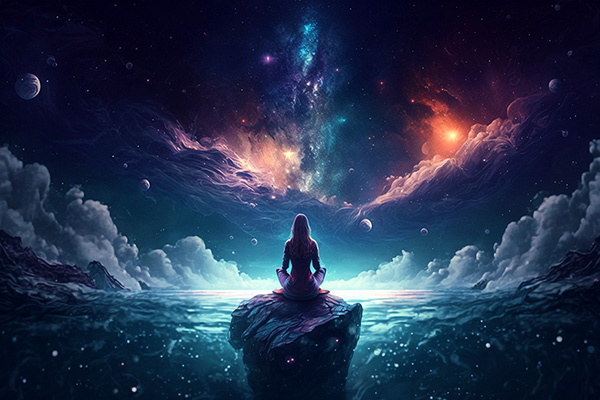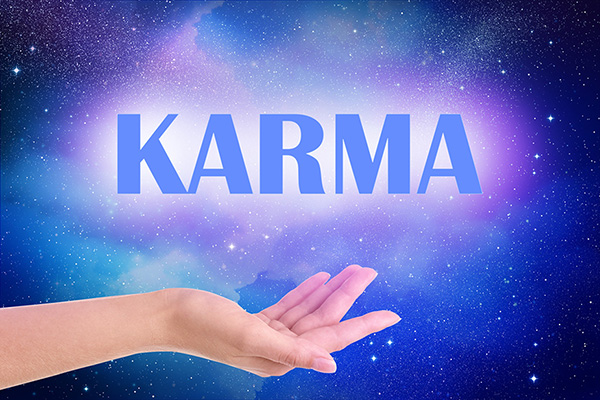choices
Staying Connected To Spirit
 If you are like me, I sometimes find it a struggle to disconnect from the ego in order to commune with spirit, Being spiritually aware and connected is a state of higher consciousness I prefer to spend as much time in as humanly possible.
If you are like me, I sometimes find it a struggle to disconnect from the ego in order to commune with spirit, Being spiritually aware and connected is a state of higher consciousness I prefer to spend as much time in as humanly possible.
Wouldn’t it be absolutely wonderful if we were always fully connected to spirit? Life is so much better and easier when my heart and mind are in the wonderful world of spirit.
Of course, it is not entirely practical or wise to always be in a higher state of consciousness, but one can certainly strive to spend more time living spiritually connected.
What I have learned to be extremely important is the practice of gratitude. Every day I try to consciously revel in all that is good and blessed in my life, instead of bringing myself down by focusing on what is wrong or lacking. We always have much more to be thankful for than we care to admit.
Another commitment I have made is to constantly remind myself that I am part of something greater than myself and connected to everyone and everything in the universe. This is not only a privilege, but also a responsibility. Regardless of how I feel on any given day, I am a spiritual being in human form who has the wonderful ability to choose the better side of myself and not let the ego take over.
I also know from experience that in order to stay spiritually connected, it is crucial for me to set aside some time each day for spiritual reflection, even if it is just a few minutes of meditation, to contemplate my purpose in this world, or ways I can be more compassionate, forgiving, or grateful.
Spiritual Self-Care Or Ego Indulgence?
 Spiritual or metaphysical practice is a pursuit designed to help bring greater meaning and fulfillment to our lives. It is a lifestyle that requires us to be very honest with ourselves and very intentional about the choices we make. But lately I’ve seen a lot of discourse around spirituality that basically encourages you to do pretty much whatever you want in the name of ‘free will’ and ‘self-care.’
Spiritual or metaphysical practice is a pursuit designed to help bring greater meaning and fulfillment to our lives. It is a lifestyle that requires us to be very honest with ourselves and very intentional about the choices we make. But lately I’ve seen a lot of discourse around spirituality that basically encourages you to do pretty much whatever you want in the name of ‘free will’ and ‘self-care.’
Free will is sacred. Yes, it’s true that we are divine, spiritual beings who get to enjoy this incredible adventure of physical life. We get to choose how we move in the world, what we want for ourselves, and how we want to live. But there are two sides to this coin. Yes, we can choose what we want to manifest and how we wish to live our lives, but that does not absolve us of our karmic responsibilities and the consequences of our actions.
I’ve written before about karma and how it’s not meant to be a punishment, but rather a teacher. There are to metaphysical laws that are the basis to our karmic responsibility in this lifetime, namely the universal law of cause and effect and the spiritual law of karma.
The universal law of cause and effect is that for every action there is a reaction. There is a natural order in the universe in which our actions always have consequences, both good and bad.
The spiritual law of karma is a more specific application of the law of cause and effect. According to this law, the totality of our actions in this life, as well as all of our past lives, determine our future. This means that our actions create the conditions for our future experiences, both good and bad.
Learning To Trust Your Intuition
 How often have you said, “If only I had gone with my gut?” This is a question that many of us have asked ourselves at one time or another about a matter, or even about the sincerity of a person who turned out to be untrustworthy, and we gave them the benefit of the doubt, only to feel heartbroken when they betrayed us.
How often have you said, “If only I had gone with my gut?” This is a question that many of us have asked ourselves at one time or another about a matter, or even about the sincerity of a person who turned out to be untrustworthy, and we gave them the benefit of the doubt, only to feel heartbroken when they betrayed us.
We don’t have to throw reason out the window when we tune into our inner wisdom called intuition. But while it’s good to have as many facts and information available as possible before making a choice or decision, there are certain times when we don’t have the luxury of first weighing all the pros and cons. Tapping into our intuition is a powerful tool for making difficult decisions and important life choices by spontaneously ‘knowing’ or ‘sensing’ what’s best for us in our work, business, relationship, or lifestyle.
For example, as a manager you may be hiring someone for a job who ticks all the boxes in terms of qualifications and experience, but that little inner voice is screaming, “Don’t hire this person!” If you then do hire them, you may find out later that they have deep-seated issues that will upset the rest of the staff and antagonize your customers.
So many clients have told me over the years that they had an overwhelming feeling that they were making a huge mistake, but they decided to marry someone because they wanted to make everyone else happy, or because so much effort and expense had gone into the wedding arrangements. Just the other day a client told me that he should have listened to his inner guidance, not to mention the guidance he received in a psychic reading that warned him that he would end up separating within a few months of the wedding. If only he had trusted his intuition.
Life Lessons From Spirit That Make Us Stronger
 As we wander through life, we often face many roadblocks, many stumbling blocks and many disappointments. There are many questions that arise as we walk our path and at times it feels like the entire world is against us, as we progress on our journey.
As we wander through life, we often face many roadblocks, many stumbling blocks and many disappointments. There are many questions that arise as we walk our path and at times it feels like the entire world is against us, as we progress on our journey.
Many people blame God, Source, Spirit, the Divine, or other people for the situations they are in, and cannot get past. This simply an illusion that we create in our humanness. Spirit does not want us to fail in life. Spirit does not want us to be unhappy. Spirit does not want us to live a pauper’s life.
It is time to sit down, take a look at all what has happened to you and discover two things about each situation. Why did it happen, and what was the lesson you learned from it? As you look at the examples of pain, suffering or disappointment in your life, what do you see? Were they life lessons from spirit?
For example, you have been with the love of your life for many years. One day your your beloved unexpectedly abandons you for another person. What could you have done to prevent this? What could you have done differently? Why were you not enough? You were in love, totally and unconditionally devoted to this person, and you thought they felt the same way about you. Why did they do this to you?
In almost all cases where this happens, there is nothing you could have done to prevent this. It was not you who walked out of the relationship or marriage; it was your partner. And all people have free will and free choice. This was not your decision to make.
The Magical Possibilities Of 6,000 Thoughts
 According to a 2020 study at Queen’s University in Kingston, Ontario, we have more than 6,000 thoughts a day. From a spiritual perspective, this is fascinating, but also potentially troublesome.
According to a 2020 study at Queen’s University in Kingston, Ontario, we have more than 6,000 thoughts a day. From a spiritual perspective, this is fascinating, but also potentially troublesome.
Those of us who are metaphysically aware know that our thoughts create our reality. Not only do our positive or negative thoughts determine what will manifest in our lives, but also how we choose to feel and act based on those 6,000 daily thoughts!
In addition, we tend to have lingering thoughts and nagging worries that we obsess over throughout the day. The more we repeat those same toxic thoughts, the more they gain energetic momentum and manifesting power. Thoughts are energy vibrations, and thoughts become things.
We all have the innate spiritual freedom to act of our own free will. Every thought we have comes with choices and options. It can range from a simple decision to stop thinking a particular negative thought…to making a life-changing decision.
Unfortunately, most people make the same choices over and over again. They stick with what is safe, comfortable, familiar, or predictable, while ignoring the other options that may be open to them. This is often how we get stuck in comfort zones, or struggle to manifest the things we dream about.
In order to manifest new things and invite change into our lives, we must carefully examine our thought patterns and habits. If we choose the same responses and actions to the same thoughts every day, we cannot expect to move forward, or create a new reality. Often the problem is not the thoughts we think, but how we choose to feel and act in response to those thoughts.
Karma Is A Teacher, Not An Avenger
 People often talk about karma as if it’s some form of divine punishment or retribution that will eventually be visited upon those who have wronged them. Letting karma “take care of it” is a comforting reassurance that we may be rewarded for being the ‘bigger person’ in unfair situations. And certainly it is always advisable to do the right thing when others are being petty or behaving badly.
People often talk about karma as if it’s some form of divine punishment or retribution that will eventually be visited upon those who have wronged them. Letting karma “take care of it” is a comforting reassurance that we may be rewarded for being the ‘bigger person’ in unfair situations. And certainly it is always advisable to do the right thing when others are being petty or behaving badly.
But this is not karma.
The universe is not in the business of handing out ‘karmic punishment,’ for we are not judged as ‘good’ or ‘bad’ for our choices and actions. All of our choices and actions have value and teach us lessons. So, why would there be any need for a universal system of punishment? Or reward, for that matter?
This is not to say that karma does not exist. On the contrary, we can see karma at work all the time in everyday life, down to the most mundane things we choose to do. However, karma is not a force of reckoning, but the cause and effect of energy, which is a universal law.
When we live a heart-centered life, doing good deeds and being kind to ourselves and others, we will feel joyful, happy, fulfilled and at peace. We thrive in the vibrant flow of positive energy. On the other hand, when we live a heartless life, do things that are wrong, destructive, and evil, and we are unkind or cruel to ourselves and others, we will feel miserable, hopeless, dissatisfied, depressed. We suffer in the thick mud of negative energy.
Transform Your Life One Step At A Time
 Knowing when to make that much needed change in your life can be daunting and very confusing. We often feel this need for change when we already have a lot going on. We tend to also overthink things and then feel overwhelmed, or even paralyzed with anxiety or fear.
Knowing when to make that much needed change in your life can be daunting and very confusing. We often feel this need for change when we already have a lot going on. We tend to also overthink things and then feel overwhelmed, or even paralyzed with anxiety or fear.
Once you get into this kind of ‘stuck’ pattern, nothing seems to get done or resolved. No choices or decisions are made. In turn, this causes even more unhappiness, distress, and turmoil in your life. We all have a tendency to get in our own way.
Over the years of working with many clients in this situation, spirit has always made one thing very clear: it always starts with a firm choice or decision. You don’t have to act on it immediately, but it instantly begins to shift your energy in a new direction, or towards a long-term solution.
Indecision, fear, or lack of commitment to a clear vision for the future is first and foremost what keeps many people stuck indefinitely in the stagnant energy loop of an unhappy, unfulfilled life.
Once you have made up your mind about what you intend to achieve or which direction you wish to go, you gain more clarity and become calmer and more grounded to start taking baby steps forward. Then you can begin to resolve the situation one step at a time with spirit’s support.
To get started consider a simple, step-by-step approach to make break the process down into smaller steps that will be less overwhelming and more attainable.